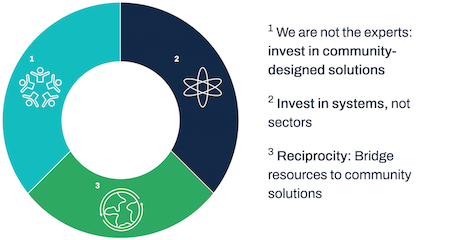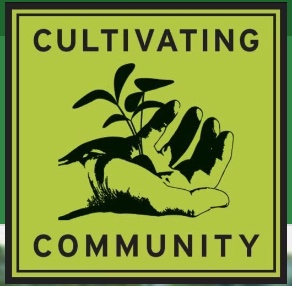“You cannot get through a single day without having an impact on the world around you. What you do makes a difference, and you have to decide what kind of difference you want to make.” – Jane Goodall
At One Earth Body Care, we believe that true sustainability depends on individuals connecting with the Earth and with each other across all perceived lines of difference, that our ultimate ability to survive and thrive depends upon respect and justice for all people and all of life, and that we each are a spark of the universe and we each have a light to shine. Your purchase supports results-oriented efforts to create positive social and environmental change. We donate 2% of all sales to the organizations shown on this page.
NONPROFITS WE SUPPORT
The mission of Health in Harmony (HIH) is to "reverse tropical rainforest deforestation to halt the climate and nature crises." HIH facilitates this through a process of listening to rainforest communities, who speak about their challenges and needs, and then by investing in the solutions these communities identify. This work results in better human health, rainforest health and planetary resilience.
Founder Kinari Webb says: "At Health In Harmony, we have shown that there is hope, and if we partner across the world, together we can achieve great impact. I truly believe that each one of us has something we can contribute to the collective path of transformation towards a sustainable planet for us all. So I ask you, “What is your commitment to making one change our planet needs now?” "
We found out about HIH by reading Kinary's book Guardians of the Trees, which we highly recommend to everyone! It is an incredible personal story as well as an "inspiring story of communities coming together to heal the world."
Five Rivers Conservation Trust is dedicated to conserving open space across the greater Capital Region of New Hampshire. Through conservation easements and land ownership, Five Rivers helps to protect productive farm and forest lands, wetlands, scenic areas, special natural communities, wildlife habitat, cultural features, rivers and streams, lakes and ponds. Their goals include preserving ecological integrity and biodiversity, providing recreational opportunities, maintaining clean water supplies, and limiting sprawl.
As of the end of 2022, Five Rivers holds conservation easements on more than 80 properties, totaling over 5,400 acres. They also own a 73-acre property in Hopkinton; a 24-acre property in Concord, and a 477 acre property in Webster/Hopkinton. These are significant conservation assets for nearby residents and wildlife.
The Pemi-Baker Land Trust (PBLT) conserves lands in the watersheds of the Baker River and Upper-Pemigewasset River of New Hampshire that offer significant public benefit and enhance quality of life. PBLT is the land protection arm of Rumney Ecological Systems, which also owns and manages the Quincy Bog Natural Area in Rumney, NH.
The mission of PBLT is to offer the public opportunities for nature education, research and nature-centered outdoor recreation at the Quincy Bog and Quincy Pasture Forest and to protect open space in the greater Baker (Asquamchumauke) River Valley in cooperation with area landowners. At the end of 2022, the PBLT protects 781 acres through conservation easements, 140 acres through ownership, and 2 additional acres by other means.
Soul Fire Farm is an Afro-Indigenous centered community farm in Petersburg, NY, committed to uprooting racism and seeding sovereignty in the food system. Soul Fire Farm raises and distributes life-giving food as a means to end food apartheid. They bring diverse communities together on this healing land to share skills on sustainable agriculture, natural building, spiritual activism, health, and environmental justice. They are training the next generation of activist-farmers and strengthening the movements for food sovereignty and community self-determination.
Soul Fire Farm food sovereignty programs reach over 160,000 people each year. These programs include farmer training for Black and Brown growers, reparations and land return initiatives for northeast farmers, food justice workshops for urban youth, home gardens for city-dwellers living under food apartheid, doorstep harvest delivery for food insecure households, and systems and policy education for public decision-makers.
The mission of ROPE is to celebrate and honor the entry of adolescent girls into womanhood and provide them with skills and knowledge that they need to be successful, independent and responsible women. It is designed to help participants discover their inner voice and support all components of personal development.
Shirley Edgerton founded ROPE in 2010. She saw that providing mentorship and opportunities to interact with professional women of color could be a way to ease young women’s transition into adulthood. ROPE is based in Berkshire County, Massachusetts. They provide a year-round program for high-school women, and they continue to provide support after graduation. Many of the girls who participate are first-generation college students who face challenges, both financial and social, as they create opportunities for themselves. ROPE tracks them all the way through school, and upon graduation, helps them find internship and entry-level positions that will set them up for professional success.
Northeast Wilderness Trust (NWT) does conservation differently. They are the only regional land trust that can promise every acre they protect today will be an old-growth forest of tomorrow. In the Northeastern United States, places where nature can evolve and thrive without human interference are rare. But together, we can change this.
Northeast Wilderness Trust believes that wild nature deserves the freedom to flourish. On forever-wild lands, people take a step back and natural processes unfold freely. The wildlands safeguarded by Northeast Wilderness Trust—encompassing 78,315 acres—are now fully protected from future development.
Cultivating Community believes in food justice for all. All of Cultivating Community’s programs are rooted in the idea that everyone has the right to good food. They empower New Americans by teaching them sustainable farming practices and connecting them to the community through our food hub. Cultivating Community supports and manages diverse urban growing spaces, enabling community members to grow their own food within city limits. They increase access to local, healthy foods for people with a low-income, providing affordable produce through farm stands and mobile markets. They invest in youth of all ages, offering opportunities for food education, community engagement, and leadership development.
Manada Conservancy is a land trust dedicated to preserving the natural, historic, agricultural and scenic resources of Dauphin County Pennsylvania through land conservation, environmental education, and community engagement.
The Conservancy formed in 1997 around concern about loss of farmland and wildlife habitat. The Conservancy’s name was chosen because the Manada Creek watershed is central to the original focus area of southern Dauphin County, PA. The name also represents the Native American history of the area and the connection of water and land to all living things. Manada Conservancy works with landowners who wish to preserve their land and its natural resources for the future and has helped to preserve nearly 2500 acres so far. Their free education programs are popular and varied and draw from a multi-county area. Their annual Native Plant sales educate and inspire and spread beneficial plants across the landscape.
Wild farming is farming in a way that supports and benefits from wild nature. This results in protecting and restoring natural habitats and creating a strong, resilient agriculture. The vision of WFA is to catalyze a bold stewardship ethic among current and new generations of farmers, land stewards, agencies, nonprofits, policy makers, scientists and educational institutions. They aim is to accelerate adoption of practices that cultivate biodiversity, and to scale this effort nationally.
The four principles of Wild Farming:
1. Soil is kept covered with plants.
2. Flowers are present.
3. Native trees and shrubs are part of the farm.
4. Wildlife, from bees and birds to larger animals, are present.
WFA works to promote these practices by helping farmers establish bird flyways, animal and insect wildways, and restored waterways.
The NAACP Legal Defense and Educational Fund, Inc. is America’s premier legal organization fighting for racial justice. Through litigation, advocacy, and public education, LDF seeks structural changes to expand democracy, eliminate disparities, and achieve racial justice in a society that fulfills the promise of equality for all Americans. LDF also defends the gains and protections won over the past 80 years of civil rights struggle and works to improve the quality and diversity of judicial and executive appointments.
The mission of UCS is “to use rigorous, independent science to solve our planet’s most pressing problems.”
The core values of UCS are: to support robust, ethical, transparent scientific research and communication; to “seek environmental and economic justice in partnership with those who face unequal burdens due to race, identity, or disparities in wealth and income.” To “value honesty, openness, and accountability. To ensure our work is independent, we take no corporate or government money.” To “work to improve the human condition, help communities build resilience, and support and restore thriving natural ecosystems.”
LAND TRUST ALLIANCE (LTA)
The Land Trust Alliance is an important voice of the land trust community. A national leader in policy, standards, education and training, LTA works passionately to support land trusts so they can save and secure more lands now and for future generations.
LTA has 948 land trust members and counting and has set a bold goal for land trusts to conserve another 60 million acres by the end of the decade. The Land Trust Alliance supports the work of land trusts and conservation organizations across the country through investments that address conservation priorities. Their programs include community-centered conservation, climate solutions, clean water, and much more.













